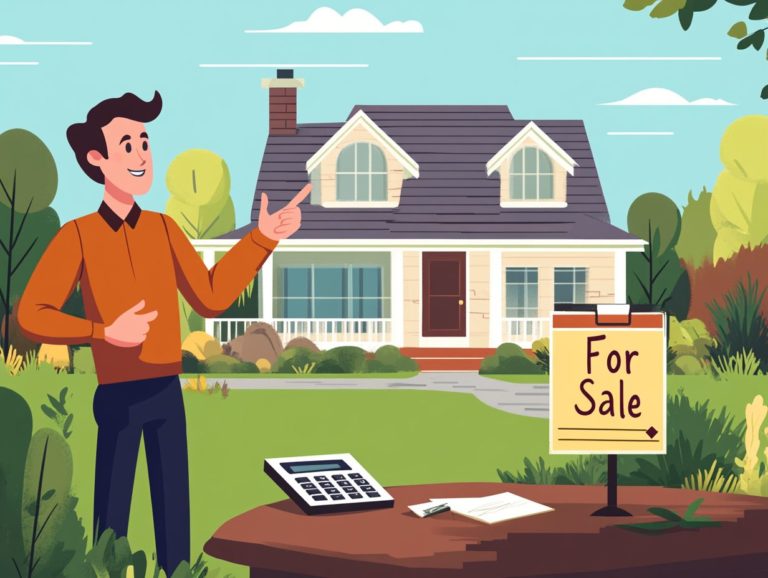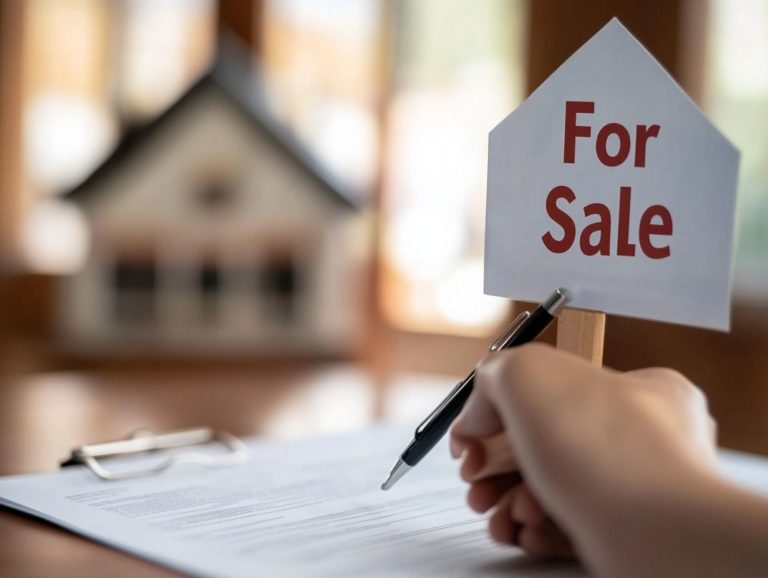How to Build Rapport with Sellers
Building strong rapport is essential for anyone aiming to cultivate lasting relationships with clients.
This article delves into the importance of rapport in sales, emphasizing effective communication techniques alongside the critical roles of trust and empathy.
It also identifies common pitfalls that may weaken connections and introduces valuable tools and resources to enhance these relationships.
You ll find strategies for maintaining rapport over time, ensuring your connections remain robust and fruitful.
Explore how mastering the art of rapport can truly transform your selling approach!
Contents
- Key Takeaways:
- Understanding the Importance of Rapport
- Strategies for Building Rapport
- Common Mistakes to Avoid
- Tools for Building Rapport
- Maintaining Rapport with Sellers
- Frequently Asked Questions
- What is the importance of building rapport with sellers?
- How can I show genuine interest in the seller as a person?
- What are some non-verbal cues that can help build rapport?
- How can I find common ground with the seller?
- What should I avoid when trying to build rapport with sellers?
- How can I maintain rapport with sellers after the transaction is complete?
Key Takeaways:

Building rapport with sellers is crucial for success in sales, as it creates a strong foundation for trust and understanding. Effective communication, building trust, and showing empathy are key strategies in building rapport with sellers. Avoid behaviors that can damage rapport, and utilize technology and resources to enhance relationships with sellers.
Understanding the Importance of Rapport
Grasping the significance of rapport in sales is essential for building lasting relationships between you and your clients. It gives you the power to build trust and adeptly address their needs.
Establishing rapport elevates your sales conversations and profoundly impacts your outcomes. By creating strong personal connections, you can enhance engagement strategies, paving the way for greater sales success.
Why Building Rapport is Essential for Sellers
Building rapport is crucial for you as a seller because it creates an environment where your customers feel valued and understood. This leads to enhanced sales effectiveness and fosters trust in your abilities.
When you establish a strong connection, your customers are more inclined to share their needs and preferences. This enables you to tailor your approach with precision.
This psychological aspect of trust building is vital, as people naturally gravitate toward those with whom they feel a personal connection. As these relationships deepen, the likelihood of receiving referrals increases.
Satisfied customers often share their positive experiences, creating a ripple effect. By nurturing these authentic connections, you not only enhance your immediate sales prospects but also cultivate a loyal customer base that actively contributes to future leads through word-of-mouth advocacy.
Strategies for Building Rapport
Utilizing effective techniques for building rapport is crucial in the sales process. These strategies create an engaging environment that addresses your buyers’ needs and fosters trust and collaboration.
Effective Communication Techniques
Effective communication techniques are essential for you when it comes to building rapport. They enable you to connect with buyers on a deeper level through emotional engagement and customized communication styles.
Different styles like passive, assertive, and aggressive play a significant role in how trust and understanding develop between you and your potential clients.
You can also improve your interactions by leveraging phatic communication, which includes casual pleasantries and small talk. This approach helps establish common ground, making clients feel both valued and understood.
In a sales context, combining a straightforward method with warmth can elevate a typical conversation into a genuine connection. Picture this: when you take a moment to ask a prospect about their weekend plans, that simple gesture can transform a transactional exchange into a rapport-building experience that nurtures loyalty.
Building Trust and Empathy
Building trust and empathy is essential in sales; these elements create a supportive environment that fosters open dialogue and understanding between you and your buyers. When you prioritize these qualities, you’re more likely to cultivate meaningful connections that transcend mere transactions.
This approach boosts customer satisfaction and increases repeat business and referrals. By implementing practical strategies like active listening, you can truly understand the nuances of your customer’s needs.
Acknowledging their concerns shows respect and reinforces their value. Engaging in emotional communication allows you to resonate with customers on a deeper level, nurturing a sense of loyalty and mutual respect that ultimately propels your sales success.
Common Mistakes to Avoid

Avoiding common mistakes in your sales conversations is essential for maintaining rapport and nurturing long-term relationships with buyers.
Certain behaviors, if not checked, can foster skepticism and ultimately undermine the trust that is so vital in sales.
Behaviors That Can Damage Rapport
Some actions can significantly undermine your rapport in sales, such as poor communication and a lack of understanding of your customers. These missteps can lead to a breakdown in relationships that are essential for success.
When you interrupt a customer or dismiss their concerns, it sends a clear message: a lack of respect. This diminishes trust and fosters an environment where the customer feels undervalued.
Picture this: a client shares their insecurities about a purchase, and instead of addressing those feelings, you quickly brush them aside, prioritizing the sale over genuine connection. This failure to empathize creates misunderstandings and makes customers hesitant to trust you in future interactions.
To turn things around, actively listen, validate customer feelings, and engage in open dialogue. Techniques such as paraphrasing their concerns and asking open-ended questions can work wonders in rebuilding that essential rapport.
Tools for Building Rapport
By utilizing the right tools to build rapport, you can significantly enhance your ability to foster meaningful relationships.
This approach streamlines communication and improves your sales leads and outcomes, giving you the power to achieve greater success in your sales endeavors.
Technology and Resources to Enhance Relationships
Customer Relationship Management (CRM) tools are essential in elevating your relationships with customers by equipping you with the necessary tools for managing interactions effectively.
These systems track conversations and preferences and analyze customer behavior, allowing you to tailor your approaches for enhanced engagement.
Beyond CRM platforms, automated systems that can chat with customers online and data analytics offer profound insights into customer needs, preferences, and pain points.
Integrating these technologies into your sales process allows you to create personalized experiences that resonate deeply with your customers, fostering trust and loyalty.
You can leverage social media listening tools to understand customer sentiment and trends, further refining your engagement strategies for optimal effectiveness.
Maintaining Rapport with Sellers
Maintaining rapport with sellers requires a proactive approach to nurturing relationships, ensuring that customer engagement remains at the forefront of the sales process.
Make it a priority to strengthen your connections with sellers, ensuring they feel valued and prioritized every step of the way.
Continuing to Strengthen Relationships
Continuing to strengthen your relationships with customers is essential for building trust and ensuring positive sales outcomes. It allows for a deeper understanding of your customers and cultivates increased loyalty.
By implementing personalized outreach methods, tailor your communications to address your customers’ unique preferences and pain points. This focused attention fosters a sense of belonging, making clients feel valued and understood.
Applying effective engagement strategies like consistent follow-ups and soliciting feedback keeps the lines of communication wide open. Prioritizing rapport-building enhances sales effectiveness and increases the likelihood of referrals.
Satisfied customers are far more inclined to share their positive experiences with others, amplifying your business s reach.
Frequently Asked Questions

What is the importance of building rapport with sellers?
Building rapport with sellers is important because it helps to establish a positive relationship with them, leading to better negotiations, increased trust, and ultimately, a more successful transaction.
How can I show genuine interest in the seller as a person?
One way to show genuine interest is to ask open-ended questions about the seller’s experience, goals, and motivations. Listen actively and respond with empathy to build a deeper connection.
What are some non-verbal cues that can help build rapport?
Non-verbal cues, like maintaining eye contact and using a friendly tone, help build rapport with sellers. These actions show that you care and understand them.
How can I find common ground with the seller?
Identify things you both like or have experienced. This builds camaraderie and strengthens your connection.
What should I avoid when trying to build rapport with sellers?
Don t be pushy or aggressive; it creates tension. Also, respect cultural differences and avoid making assumptions.
How can I maintain rapport with sellers after the transaction is complete?
Keep the conversation going! Show genuine interest in their well-being for long-term relationships and future business.







